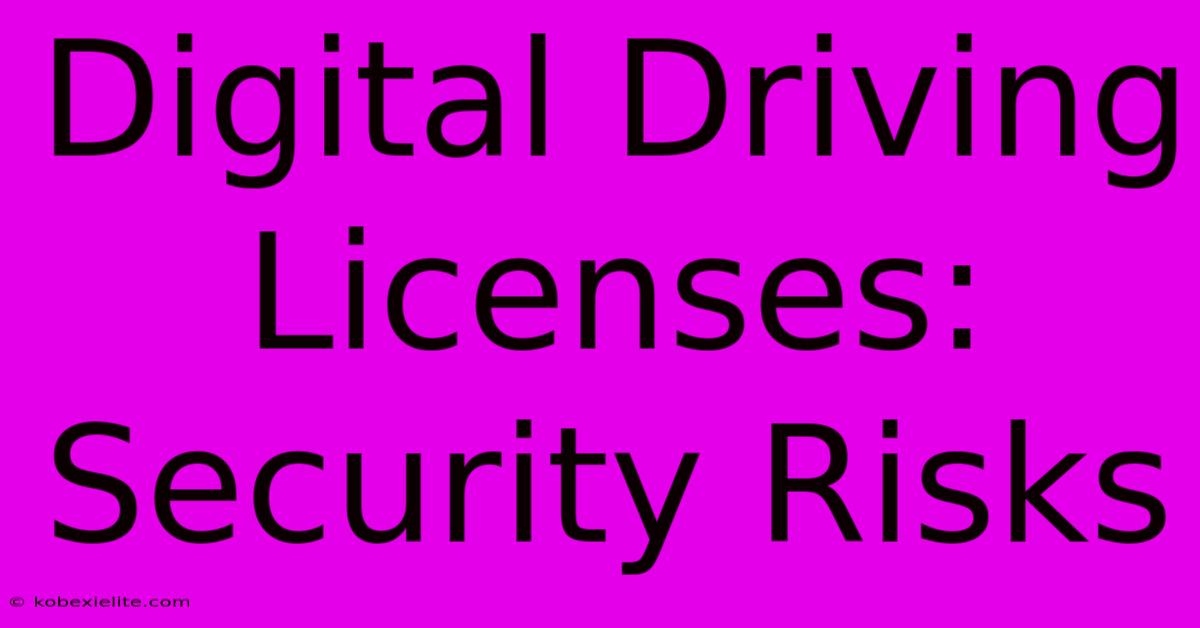Digital Driving Licenses: Security Risks

Discover more detailed and exciting information on our website. Click the link below to start your adventure: Visit Best Website mr.cleine.com. Don't miss out!
Table of Contents
Digital Driving Licenses: Security Risks and Mitigation Strategies
The shift towards digitalization is transforming various aspects of our lives, and driving licenses are no exception. Digital driving licenses (DDLs) offer convenience and efficiency, but they also introduce a new set of security risks that need careful consideration. This article explores the potential vulnerabilities associated with DDLs and discusses strategies to mitigate these risks.
The Appeal of Digital Driving Licenses
Before diving into the security concerns, it's important to acknowledge the benefits driving the adoption of DDLs. These include:
- Convenience: Easy access to your license information anytime, anywhere, eliminating the need to carry a physical card.
- Efficiency: Streamlined processes for law enforcement verification and other official purposes.
- Reduced fraud: Potentially harder to counterfeit compared to physical licenses.
- Environmental benefits: Reduced reliance on physical cards contributes to sustainability efforts.
Security Risks Associated with Digital Driving Licenses
Despite the advantages, the digital nature of DDLs exposes them to several security threats:
1. Data Breaches and Leaks
A major concern is the potential for data breaches targeting the databases storing DDL information. A successful breach could expose sensitive personal data like name, address, date of birth, photograph, and driving history—information that can be used for identity theft or other malicious purposes. Robust cybersecurity measures are crucial to prevent such incidents.
2. Phishing and Social Engineering Attacks
Malicious actors could use phishing emails or other social engineering tactics to trick individuals into revealing their DDL credentials or accessing malicious websites designed to steal their data. User education is vital in mitigating these risks.
3. Device Compromise
If a user's smartphone or other device storing their DDL is compromised (e.g., through malware or hacking), their license information could be accessed or misused. Strong device security practices, including using strong passwords, enabling two-factor authentication, and installing reputable security software, are essential.
4. Data Modification and Falsification
The integrity of DDL data is paramount. If malicious actors manage to alter the information on a digital license, it could have serious legal and safety consequences. Strong encryption and digital signature technologies are necessary to prevent unauthorized modifications.
5. Privacy Concerns
The collection and storage of personal data associated with DDLs raise privacy concerns. Data minimization and anonymization techniques should be employed to protect user privacy while maintaining the functionality of the DDL system.
Mitigation Strategies: Securing Digital Driving Licenses
Addressing the security risks associated with DDLs requires a multi-faceted approach:
- Robust Cybersecurity Infrastructure: Governments and organizations responsible for managing DDL systems must invest in strong cybersecurity infrastructure, including firewalls, intrusion detection systems, and regular security audits.
- Strong Authentication and Authorization: Implement robust authentication mechanisms, such as multi-factor authentication, to verify user identities and control access to DDL data.
- Data Encryption and Protection: Employ strong encryption techniques to protect DDL data both in transit and at rest.
- Regular Security Updates and Patches: Keep software and systems up-to-date with the latest security patches to address vulnerabilities.
- User Education and Awareness: Educate users about the risks associated with DDLs and best practices for protecting their information.
- Regular Audits and Compliance: Conduct regular security audits and ensure compliance with relevant data protection regulations.
- Blockchain Technology: Exploring the use of blockchain technology could enhance the security and immutability of DDL data.
Conclusion
Digital driving licenses offer significant advantages, but their security must be a top priority. By implementing robust security measures and fostering user awareness, we can harness the benefits of DDLs while mitigating the associated risks and ensuring the safety and privacy of individuals. Continuous monitoring and improvement of security protocols are vital for maintaining the integrity and trustworthiness of this emerging technology. The future of digital driving licenses hinges on a commitment to robust security and responsible data management.

Thank you for visiting our website wich cover about Digital Driving Licenses: Security Risks. We hope the information provided has been useful to you. Feel free to contact us if you have any questions or need further assistance. See you next time and dont miss to bookmark.
Featured Posts
-
Schottenheimer Gets Second Cowboys Interview
Jan 23, 2025
-
Cowboys Consider Schottenheimer For Oc
Jan 23, 2025
-
Birthright Citizenship The Court Case
Jan 23, 2025
-
Leeds Defeat Norwich 2 0 James Stars
Jan 23, 2025
-
Brian Schottenheimer Second Cowboys Interview
Jan 23, 2025
